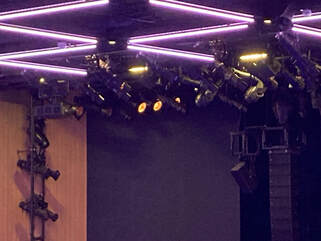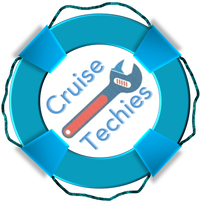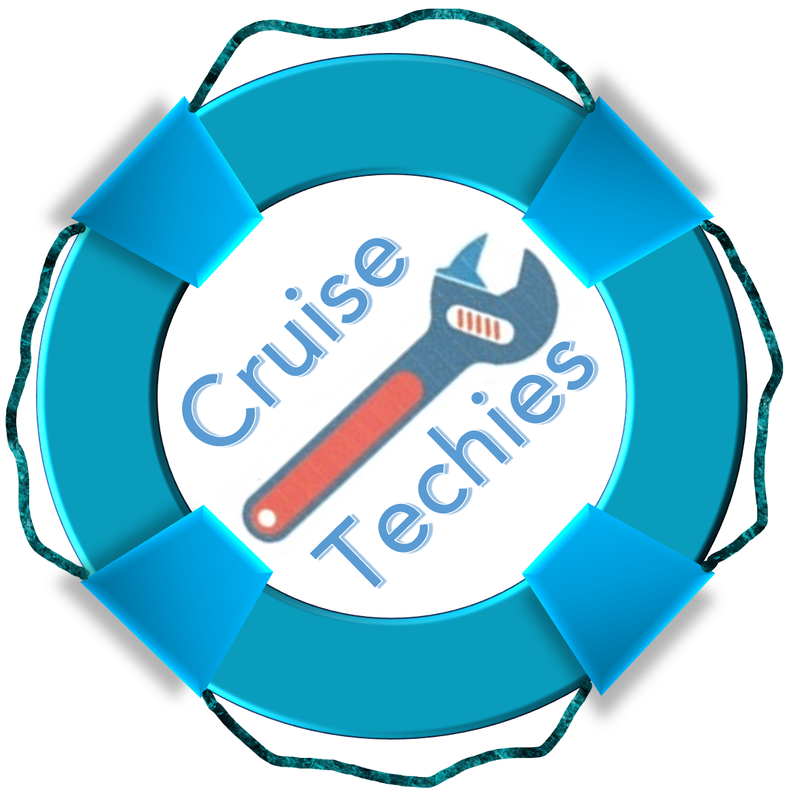 Joie and Abby have different qualifications, yet both ended up in theatre management on a cruise ship. Joie did a lot of his learning through experience coupled with a lot of research. When Joie started (and the same goes for me) nothing was digital - running light and sound boards were manually done, cues were ‘recorded’ on paper, patching used physical cables and plugs, and so on. Joie started out working with some entrepreneurial high school friends who were renting out a sound control system, which they would set up, and run, for parties and weddings. It was then that he got the bug, and so he started researching and learning more on his own. He not only learned sound – his main passion – but also lighting and props. He started out his cruising career with contracts in lighting, sound, and also as a props master. It was this background of a variety of skills and experience that qualified him for theatre management. Abby, on the other hand, did most of her learning in a formal educational setting. She first caught the bug when she was just 12 years old, when she stage managed a school production. Concurrently, her family cruised a lot when she was growing up. One day on a cruise, when she was 13, she went to a show and noticed the people in the booth. She dragged her dad up to the booth so that she could talk to the stage manager for the production! It was right then that she knew she – very specifically - wanted to be a PSM (Production Stage Manager) on a cruise ship, and she hasn’t looked back. All through high school she worked as a stage manager for school and community productions. She then went to university and got her BA in Theatre Design and Technology. So, what do you need to bring to the table when applying for a theatre tech job on a cruise ship; experience or education – or both? Tech Theatre is a high school CTE (Career and Technical Education) subject in most states. It’s not a profession where everyone needs to go to university in order to succeed. Many do succeed by going directly to the trade school and/or apprenticeship route.
If you choose the university route, Abby highly recommends you get a BA, not a BFA. Especially if you want to go into stage management, because a BA allows you to learn everything in theatre, which allows you to be more versatile, and therefore more employable. Abby not only learned stage management, but was also a costume designer and a director. And, in fact, because there wasn’t actually a stage management mentor at her university, she learned stage management from the lighting design professor. I myself got a BA, and while I specialized in lighting design and a bit of stage management (also taught by my lighting design professor), I also gained skills in set design and building and costumes, etc. Likewise - if you choose the experience track, do as Joie and I did - learn a bit of everything! But, as Abby warns, don’t expect to get a job on a cruise ship and go straight into production stage management as she did. Hers was a unique situation, where she came into university having more stage management experience than most students do leaving university. After a period of time teaching college, and then the pandemic thwarting a job with Royal Caribbean as a venue ASM, the silver lining was that after the pandemic Norwegian Cruise Lines actually reached out to her after seeing her resume and hired her directly into a PSM position. She worked as the PSM in Tampa for “Six”, then worked on the Joy and the Escape before working with “Jersey Boys” and coming aboard the Bliss. More typically you’ll raise up through the ranks, with or without a formal degree, much as Joie did. It’s best to be versatile, and that way you can apply for any job just to get your feet wet. (Hopefully not too wet, being on a cruise ship!) When asked what advice Joie and Abby had for anyone considering a career in theatre on a cruise ship, they both had similar things to say. First – versatility. If you’re interested in being a show production technician – lights, sound, automation, stage, costuming, props, etc – then it’s best to have direct experience and/or education in your specialty – but still with some experience in all of the specialites. For the lounge techs, specializing is not so imperative, and in fact you will be more employable if you are a ‘jack of all trades’. Most of the lights and sound requirements are pre-programmed for the smaller venues, and you will likely end up running both. But, you still need to have enough experience and training in theatre tech, because at times a new musician or performer will ask for something different. It is however more important to have a grasp on sound if you are setting up a band in one of the ship's venues, and need to mix that live. A lot of technicians ‘rise up through the ranks’, starting out as lounge techs and progressing to theatre production techs. Regardless of where you work on board a ship, you must have some sort of technical theatre background and a concept of the theatrical process. To run lights and sound these days, you also have to come in with at least some experience running digital boards. As long as you know the fundamental protocols, you can learn how to run each ship’s light or sound console when you arrive on board, but as Joie said, this isn’t school anymore and they’re not going to teach you from scratch. And, it’s best if you know both lights and sound, because most technicians will be required to do both, especially for the smaller venues, and especially when you’re starting out. Joie also mentioned that these days they’re looking for some sort of certification. Whether this be a certification from a trade school or from a university, or specialty certifications such as rigging certifications. Experiencing a cruise ship first hand can also help you decide – before you sign up for a months-long contract – what sort of ship you want to work on. In Abby’s case she was able to tour Royal Caribbean’s Oasis of the Seas (one of the world’s largest ships) and Liberty of the Seas (one of the smaller ships), and knew right away that the mega ships were where her heart lies. The mega ships tend to have more specialization, whereas the jobs on the smaller ships may be more of a mixture. For instance, one person may be doing the work of a PSM and the TOM (Theatre Operations Manager) – essentially acting as the company manager. But, there’s a difference between company management and calling the shows, and you may like to do both, or you may prefer just one aspect. Likewise with lights and sound – on the smaller ships you may find yourself doing both. So, it’s best to ask yourself, do I want to specialize or do I want to be involved in all aspects of tech. Abby mentioned that during her sophomore year in Fort Lauderdale, she was super lucky because the cruise ships were in, so she would get a day pass on a ship. If you’re lucky enough to be in a cruise port town, take advantage of it so that you can get a direct idea of what it’s like. If you’re not able to tour a local cruise ship, or if you want to find out more, be sure to book a Discovery Cruise! Well, there you have it. Lots to think about – what experience, training, and education will you bring to the table? And what decisions do you need to make before you commit to a months-long contract. NEXT WEEK’S BLISS-FUL TOPIC: I got the job! What will my work schedule be like? Curious about working on a cruise ship? Check out the Master Class Serious about working on a cruise ship? Check out the Discovery Cruise Don’t forget to check out the Slop Chest for your must-have cruise related apparel, etc! https://www.cruisetechies.com/slopchest.html
0 Comments
Leave a Reply. |
NO MORE SEARCHING
Your ONE-STOP PORT for information about working in theatres on cruise ships. Here you will find interviews with on board techies, links to cruise techie YouTubers, and useful information about working on cruises. WANT TO FIND OUT MORE ABOUT WORKING ON A CRUISE SHIP?
Check out a Discovery Cruise! Teachers can go on Discovery Cruises, too! Click here LETS BE SHIP MATES!
Categories
All
Archives
June 2024
COMMENT POLICY
ContactComments will be deleted that are: deemed to be spam, profane, offensive, abusive; promotional; not relevant to post; harassing or disrespectful to contributors; anonymous. I reserve the right to edit or delete any comments without notice. This comment policy is subject to change at any time. Contact Us with questions |
CruiseTechies, a division of Rand Consulting and Design LLC


